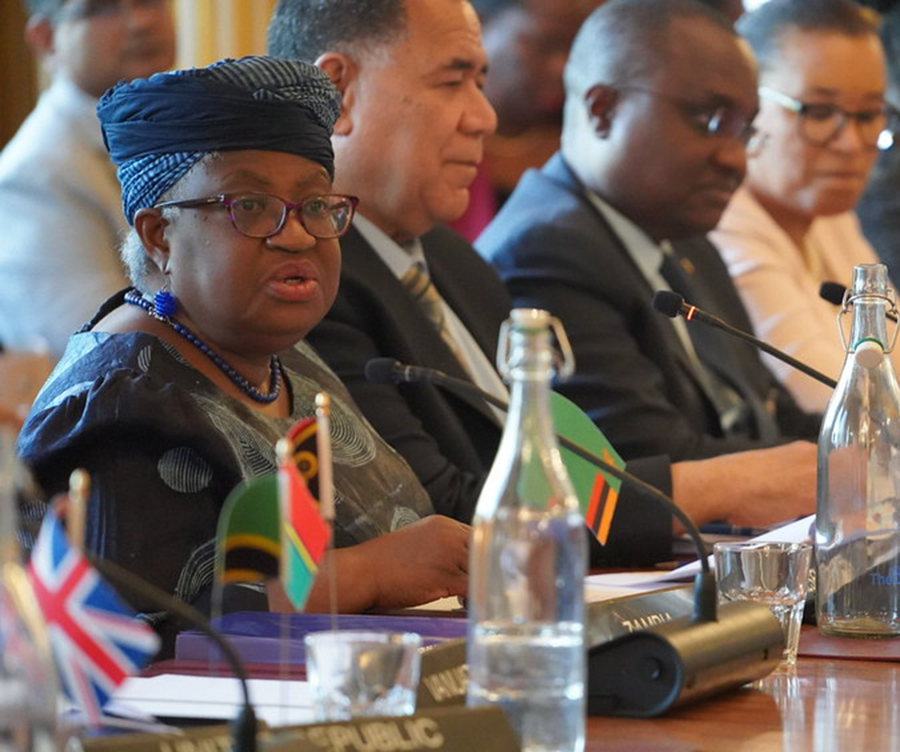As efforts to reach net zero by 2050 intensify, the emphasis at the Commonwealth trade ministers meeting last week was on creating green trade policies to combat climate change and promoting digital trade across member countries.
In an exclusive interview with GTR, director-general of the World Trade Organization (WTO) Ngozi Okonjo-Iweala explained the organisation’s priorities in the coming years.
Okonjo-Iweala – whose four-year term began in 2021 and made her the first woman and the first African to serve as director-general – outlined the importance of making sure tariffs did not inadvertently prioritise fossil fuels over renewable energies.
This was echoed by Pedro Manuel Moreno, the deputy secretary-general of the United Nations Conference on Trade and Development, who told GTR that one potential solution would be to apply non-tariff measures to renewable energy and related products, a move that would also help level the playing field for least developed countries.
“The main challenge is financing, and access to technology transfer systems,” he said, and reiterated the importance of bodies like the WTO: “We need a rules-based multilateral trading system with a strong WTO at its centre.”
GTR: How is the WTO using trade policy to accelerate the green transition?
Okonjo-Iweala: When people think of trade, they often think it’s part of the problem – the logistics of trade creates carbon emissions, and so on. But trade is part of the solution. On our side, there are several reasons why we think that. If you want to transfer technologies and have people adopt these technologies, you’ve got to have trade to make that happen. The second thing is adaptation or mitigation. When you have a climate event, you can’t recover without trade. Trade is a tool for mitigation, adaptation, transfer of technology and building resilience.
More importantly, trade can make it simpler to adopt technologies. If you look at many countries, they often don’t realise that sometimes a tariff regime for fossil fuel-intensive goods is better than the one for renewables, so you have higher tariffs for renewable products, which you want people to adopt. We’re trying to change that mindset. We’re trying to craft sets of recommendations and policies ready for Cop28. If you want to reach net zero by 2050, what kinds of trade-related policies, including your tariff regime, should you be looking at?
We also believe in eventually trying to get an environmental goods and services agreement that looks at a set of goods, and then tries to get a multilateral agreement on tariffs for them. That’s something we’ve not done yet, but it’s something we’d like to see. One negotiation for about 200 goods was shelved in 2016, because politics got into it. We hope to revive this, maybe with a limited set of goods.
Finally, we’re working on a global framework for carbon pricing along with the International Monetary Fund, the World Bank and the OECD. We’re all trying to get a handle on this, because from the economics viewpoint, we believe that having a global approach to carbon pricing will make it easier to deal globally with trade issues. Right now, we have 70 fragmented carbon pricing, taxing and trading systems. Some are quite different from one another, while some don’t really reflect the true price of carbon. We’re saying, why not have a global approach and develop a framework in which you can look at all the factors that should be considered? We fear trade frictions from the present approach.
GTR: What progress has been made so far in digitising trade? What are the WTO’s future plans?
Okonjo-Iweala: First, I want to preface this by saying that the fastest growing segment of trade is digitally delivered services trade. You’ve got US$25tn in goods trade and US$7tn in services trade. Of that US$7tn, US$3.8tn is digitally delivered services. It’s obvious to us that the future of trade is in services, it is digital, green, and it should be inclusive.
There are no rules that underpin digital trade like we have for goods trade, so 90 WTO members are busy negotiating an e-commerce agreement that will underpin the rules for digital trade.
On the supply side, we are working with the International Trade Centre. They are supporting women and micro, small and medium enterprises in various countries to try to trade digitally, by focusing on the challenges that they face with access to knowledge of markets and access to credit or trade finance.
The third part is our trade facilitation agreement, which became effective in 2017. Part of this has to do with the members trying to digitise, do away with the bureaucracy of trade, and have a single window for all the transactions.
GTR: Given the increase in bilateral and regional trade deals in recent years, does the WTO still have a role to play in promoting international co-operation?
Okonjo-Iweala: Absolutely. We need multilateral fora. Even when people are having political disagreements, even when there are geopolitical tensions, there are certain problems in the world – like climate change and the pandemic – that no one country can solve alone. You can only solve them through multilateral approaches, and that means global co-operation. That means you need convening places like the WTO, where everyone can get together.
Additional reporting by John Basquill.
Image credit: Commonwealth Secretariat







